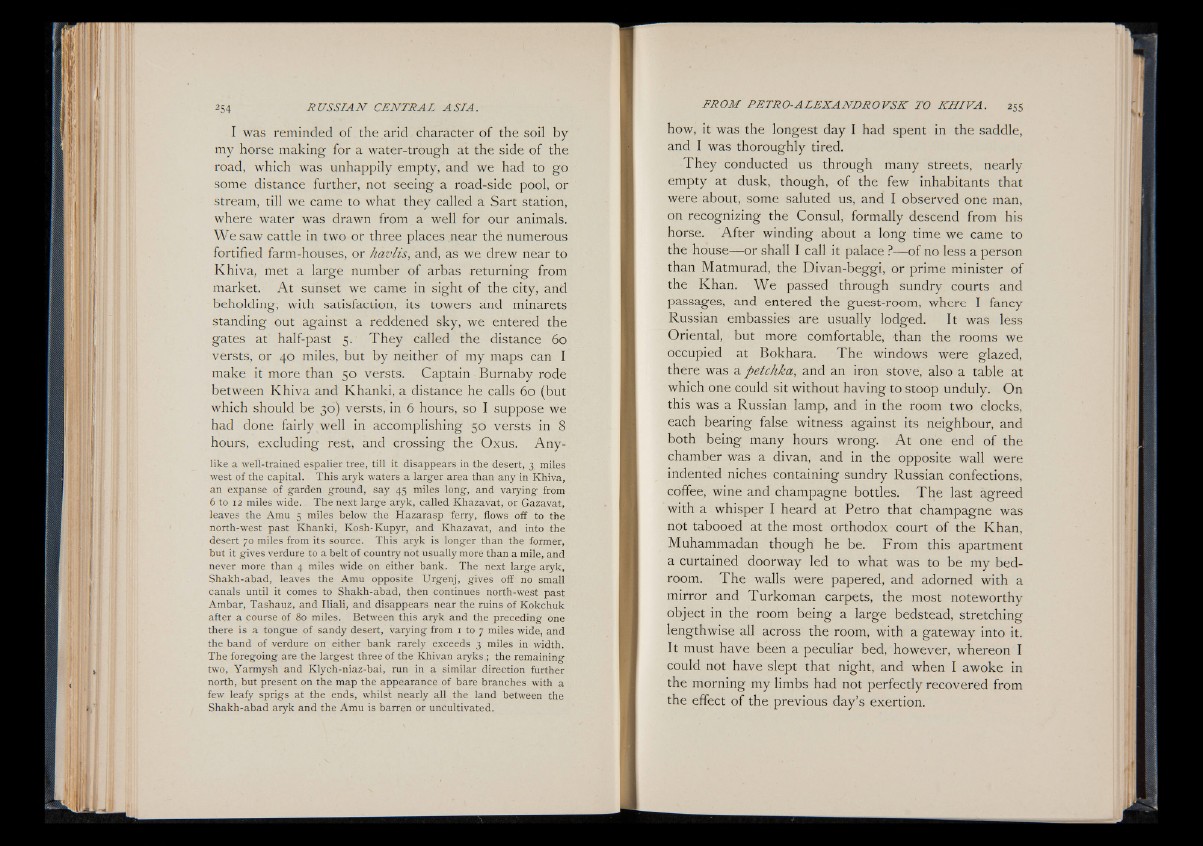
I was reminded of the arid character of the soil by
my horse making for a water-trough at the side of the
road, which was unhappily empty, and we had to go
some distance further, not seeing a road-side pool, or
stream, till we came to what they called a Sart station,
where water was drawn from a well for our animals.
We saw cattle in two or three places near thé numerous
fortified farm-houses, or havlis, and, as we drew near to
Khiva, met a large number of arbas returning from
market. A t sunset we came in sight of the city, and
beholding; with satisfaction, its towers and minarets
standing out against a reddened sky, we entered the
gates at half-past 5. T h e y called the distance 60
versts, or 40 miles, but by neither of my maps can I
make it more than 50 versts. Captain Burnaby rode
between Khiva and Khanki, a distance he calls 60 (but
which should be 30) versts, in 6 hours, so I suppose we
had done fairly well in accomplishing 50 versts in 8
hours, excluding rest, and crossing the Oxus. Anylike
a well-trained espalier tree, till it disappears in the desert, 3 miles
west of the capital. This aryk waters a larger area than any in Khiva,
an expanse of garden ground, say 45 miles long, and varying from
6 to 12 miles wide. The next large aryk, called Khazavat, or Gazavat,
leaves the Amu 5 miles below the Hazarasp ferry, flows off to the
north-west past Khanki, Kosh-Kupyr, and Khazavat, and into the
desert 70 miles from its source. This aryk is longer than the former,
but it gives verdure to a belt of country not usually more than a mile, and
never more than 4 miles wide on either bank. The next large aryk,
Shakh-abad, leaves the Amu opposite Urgenj, gives off no small
canals until it comes to Shakh-abad, then continues north-west past
Ambar, Tashauz, and Uiali, and disappears near the ruins of Kokchuk
after a course of 80 miles. Between this aryk and the preceding one
there is a tongue of sandy desert, varying from r to 7 miles wide, and
the band of verdure on either bank rarely exceeds 3 miles in width.
The foregoing are the largest three of the Khivan aryks ; the remaining
two, Yarmysh and Klych-niaz-bai, run in a similar direction further
north, but present on the map the appearance of bare branches with a
few leafy sprigs at the ends, whilst nearly all the land between the
Shakh-abad aryk and the Amu is barren or uncultivated.
how, it was the longest day I had spent in the saddle,
and I was thoroughly tired.
T hey conducted us through many streets, nearly
empty at dusk, though, of the few inhabitants that
were about, some saluted us, and I observed one man,
on recognizing the Consul, formally descend from his
horse. After winding about a long time we came to
the house— or shall I call it palace ?— of no less a person
than Matmurad, the Divan-beggi, or prime minister of
the Khan. We passed through sundry courts and
passages, and entered the guest-room, where I fancy
Russian embassies are usually lodged. It was less
Oriental, but more comfortable, than the rooms we
occupied at Bokhara. The windows were glazed,
there was a petchka, and an iron stove, also a table at
which one could sit without having to stoop unduly. On
this was a Russian lamp, and in the room two clocks,
each bearing false witness against its neighbour, and
both being many hours wrong. A t one end of the
chamber was a divan, and in the opposite wall were
indented niches containing sundry Russian confections,
coffee, wine and champagne bottles. T h e last agreed
with a whisper I heard at Petro that champagne was
not tabooed at the most orthodox court of the Khan,
Muhammadan though he be. From this apartment
a curtained doorway led to what was to be my bedroom.
T h e walls were papered, and adorned with a
mirror and Turkoman carpets, the most noteworthy
object in the room being a large bedstead, stretching
lengthwise all across the room, with a gateway into it.
It must have been a peculiar bed, however, whereon I
could not have slept that night, and when I awoke in
the morning my limbs had not perfectly recovered from
the effect of the previous day’s exertion.